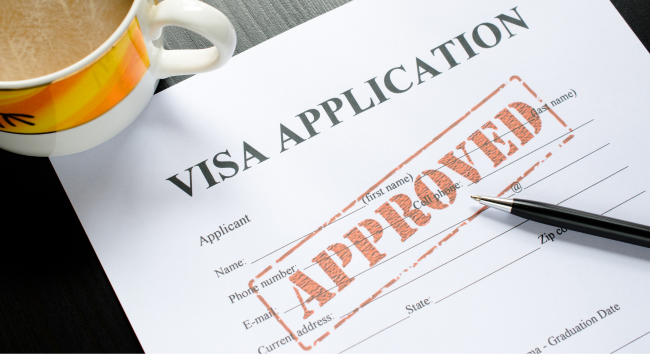2025 Australia Subclass 485 Temporary Graduate Visa: Eligibility, Types, Fees & Application Guide

If you’re about to complete your studies in Australia and want to stay after graduation to work, gain practical experience, or prepare for permanent residency, the Temporary Graduate Visa (Subclass 485) is an essential pathway to consider.
This 2025 guide explains everything you need to know about the 485 visa in Australia — including eligibility requirements, visa streams, required documents, and a step-by-step application process. Learn how to make the most of your application timeframe and smoothly transition from student life to building your career in Australia.
INDEX
I. What is the Australia 485 Temporary Graduate Visa and who is eligible?
II. Visa streams explained and regional extension benefits
III. Step-by-step 485 visa application process and required documentsIV. Why choose us to handle your application?
V. 485 Visa FAQs – your questions answered
VI. Conclusion: Plan ahead and secure your next career step in Australia
I. What is the Australia 485 Temporary Graduate Visa & who is eligible?

1. Introducing the 485 Temporary Graduate Visa
Due to Australia's long-standing skills and labour shortages, the government has introduced the Temporary Graduate Visa(Subclass 485)to attract and retain talented international graduates. This visa allows eligible international students who have completed an Australian qualification to stay after graduation and work, undertake internships, or look for employment.
With a 485 visa, you can travel freely in and out of Australia during its validity, gain valuable local work experience, improve your professional skills, and even complete additional vocational training— all of which can help you prepare for a future permanent residency (PR) application. Depending on your qualification and study location, the visa can be granted for up to four years.
-
Base application fee:From AU$2,235 (price increase effective July 2025)
- Additional applicant fees:
Secondary applicant ages 18 and over: AU$1,150
Secondary applicant under 18:AU$560

2. 485 Visa Eligibility Requirements
To qualify for the Temporary Graduate Visa (Subclass 485) in 2025, you must meet the following criteria:
-
Under 36 years old at the time of application (Master’s by Research and PhD graduates may be eligible up to under 50).
-
Course must be CRICOS-registered and delivered entirely in English
-
Must have physically studied in Australia for over 16 months, with a COE duration of at least 92 weeks.
- Must apply within 6 months after graduation.
-
Must be in Australia when applying.
-
You may include eligible secondary applicants (e.g., spouse or dependent children).
-
Generally, you can only be granted a 485 visa once, unless you meet specific exceptions — such as being eligible for a regional extension or under other special policy provisions.
II. Visa streams explained and regional extension benefits
1. Visa Streams
-

Post-Higher Education Work Stream-
Applicable to:Graduates who have completed a Bachelor's, Master's or Doctoral degree in Australia.
-
Additional condition:Your first student visa must have been granted on or after 5 November 2011.
-
Visa duration:
-
Bachelor's / Master's by Coursework:2 years
-
Master's by Research / Doctorate (PhD):3 years
-
-
Skills asessment required?:❌ No
-
-

Post-Vocational Education Work Stream-
Applicable to:Graduates who have completed two or more years of study in a diploma or certificate-level program in Australia.
-
Occupation requirement:Your field of study must be listed on the Medium and Long-term Strategic Skills List (MLTSSL) published by the Department of Home Affairs.
-
Visa duration:1.5 years
-
Skills assessment required?:✅ Yes — through Trades Recognition Australia (TRA).
👉 Further reading: All You Need to Know About Studying Vocational Course in Australia with a detailed overview of Australia’s vocational education system and the most popular vocational schools. -
2. Regional 485 Visa Extension Policy
- Category 1 - Major Cities:Sydney, Melbourne, Brisbane
- No additional 485 visa extension.
- No additional 485 visa extension.
- Category 2 - Cities and Major Regional Centres:Perth, Adelaide, Gold Coast, Sunshine Coast, Canberra, Newcastle/Lake Macquarie, Wollongong/Illawarra, Geelong, Hobart
-
Eligible for an additional 1 year on the 485 Post-Study Work visa.
-
Priority processing for regional visas.
-
Access to the regional occupation list, which includes more eligible occupations compared to the non-regional list.
-
- Category 3 – Regional Centres and Other Regional Areas:
All other regional areas not in Categories 1 or 2 (over 11,200 postcodes)
-
Eligible for an additional 2 years on the 485 Post-Study Work visa.
-
Priority processing for regional visas.
-
Access to the regional occupation list with more eligible occupations and extra migration benefits.
-
Potential access to Designated Area Migration Agreements (DAMAs) for certain regions.
-
👉 To check whether a school is in Category 2 or Category 3, refer to the official Designated Regional Area Postcode List.
III. Step-by-step 485 visa application process and required documents
The application process is not complicated, but it does involve many details. Below is the complete process and document checklist to help you understand everything in one go!

1. Required Documents
Below is the essential document checklist for a Temporary Graduate Visa (Subclass 485) application. Ensure all documents are accurate, current, and in the correct format. Some items (such as English test results and AFP police checks) have validity periods, so it’s best to prepare them early to avoid delays.
-
Completion Letter from your institution
-
Academic transcript
-
Valid English test results within the past 12 months
-
-
IELTS: overall 6.5 (no band below 5.5)
-
PTE Academic: overall 55 (listening 40, speaking 39, reading 42, writing 41) from 07 Aug 2025
-
-
-
Copy of passport
-
Evidence of current student visa
-
Overseas Visitor Health Cover (OVHC) for both primary and secondary applicants
-
AFP National Police Check (Australia)
-
Proof of address (e.g., utility bill or bank statement)
-
English-language birth certificate or household registration extract
-
Skills assessment (if applicable)
-
Any other supporting documents
👉 Further reading: How to Apply for an AFP Police Check for the 485 Visa – Step-by-Step Guide and Important Tips.
2. Application Process Overview
|
Step |
Details |
Notes |
|---|---|---|
|
1. Confirm course completion and obtain a Completion Letter |
After you finish your course, your school will issue a Completion Letter confirming graduation, usually 1–2 weeks after the end date. |
You must request this from your school. |
| 2. Prepare required documents and English test results |
Gather all the required documents listed above. |
English test results must be valid within the past 12 months; apply early for AFP police check. |
|
3. Register an ImmiAccount and submit your application |
Create an account on the official ImmiAccount portal, complete the form, upload documents, and pay the application fee. |
Your application is only officially lodged once the fee is paid — check everything carefully before submitting. |
|
4. Book your health examination early |
Once you have your HAP ID, you can book a health exam immediately — no need to wait for a request. |
Early medicals can speed up processing, especially as many cases are auto-assessed. |
|
5. Wait for processing and respond to any requests |
Immigration may request further documents. |
You’ll receive a Bridging Visa to remain lawfully in Australia until a decision is made. |
IV. Why choose us to handle your application?
While you can apply for a 485 visa yourself, the process can be confusing:
-
Is your document format correct?
-
Will you meet deadlines?
-
Which regional policy should you choose?
Incomplete or late submissions can delay or even result in a refusal.
Our professional team assists hundreds of students every year to successfully secure their 485 visas. We:
-
Avoid common mistakes and risks.
-
Offer full Chinese-language support for smooth communication.
-
Provide one-on-one tracking of your application status.
-
Give tailored advice on regional options to maximise your PR points advantage.
👉 See more success stories on our official Instagram: Level Up 485 Visa Approvals.
V. 485 FAQs - your questions answered
Q1. What is the 485 Visa?
A:The Temporary Graduate Visa (Subclass 485) lets eligible international graduates stay in Australia after completing their studies to work, undertake internships, or job-hunt, for up to four years.
Q2. Who can apply?
A:Applicants must be under 36 (or under 50 for Master’s by Research/PhD), have completed a CRICOS-registered course, studied in Australia for at least 16 months, and apply within 6 months of graduation while in Australia.
Q3. What visa streams are available?
A:
-
Post-Higher Education Work Stream: For Bachelor’s, Master’s, and Doctoral degrees; no skills assessment required.
-
Post-Vocational Education Work Stream: For diploma/certificate graduates; skills assessment required and occupation must be on the MLTSSL list.
Q4. Is a skills assessment always required?
A:No. Higher Education stream does not require it, but the Vocational stream does.
Q5. Do I need to work on a 485 visa?
A:Work is not mandatory, but you can work full-time. Many use this period to gain experience or prepare for migration.
Q6. Can regional graduates extend their visa?
A:Yes. Graduates from Category 2 or Category 3 regional areas may receive an additional 1–2 years, plus access to extra migration points and special occupation lists.
Q7. What documents are required?
A:Completion letter, transcript, English test results (IELTS/PTE), passport, student visa evidence, OVHC, AFP check, proof of address, birth certificate, and skills assessment (if applicable).
Q8. What’s the application process?
A:Confirm graduation → prepare documents → lodge via ImmiAccount and pay → book health exam → wait for processing. A Bridging Visa is granted in the meantime.
Q9. Can I include my spouse or children?
A:Yes. Secondary applicants must provide proof of relationship and have appropriate health cover.
Q10. Do I need an agent?
A:Not required, but an experienced agent can check your documents, advise on regional options, and reduce mistakes or delays.
VI. Conclusion: Plan ahead and secure your next career step in Australia
The 485 visa is more than just extra time in Australia — it’s a bridge between your studies and your career. Whether your goal is to gain local work experience or prepare for PR, now is the time to start preparing. By understanding the requirements early and organising your documents in advance, you’ll be ready to apply before any policy changes.
If you’re unsure about the process, missing documents, or want to explore regional advantages, talk to our professional team to ensure a smooth and successful application.
👉 Further reading: All You Need to Know About Studying Vocational Course in Australia
Disclaimer
-
This article is provided by Level Up Studies to share information on studying and migration in Australia. The content is for reference only and does not constitute legal, visa, or migration advice. Please refer to the Australian Department of Home Affairs and relevant official school information for the most accurate and up-to-date details.
-
Salary and employment opportunities vary with market conditions. Data is sourced from publicly available platforms (such as Seek, Talent, etc.). Actual salaries and job availability may differ. We do not guarantee that readers will secure specific positions or salaries.
-
Visa outcomes vary by individual. Meeting eligibility requirements does not guarantee approval. We are authorised with an Australian Registered Migration Agent (MARA: 1790845) and a Licensed Education Agent Counsellor (QEAC #2822) and can provide professional consultation, but final decisions rest with the Australian Government.
-
Courses and migration policies may change. Information on tuition fees, course start dates, and migration requirements in this article is for reference only. Please confirm the latest details with the relevant school or our consultants.
-
We are not responsible for third-party decisions, such as school admissions, visa processing, or skills assessments. Applicants are advised to carefully assess their situation and consult a professional adviser for tailored recommendations.
For a personalised study and migration plan, please contact our professional consultant team.





__25H12eeVW1.png)


